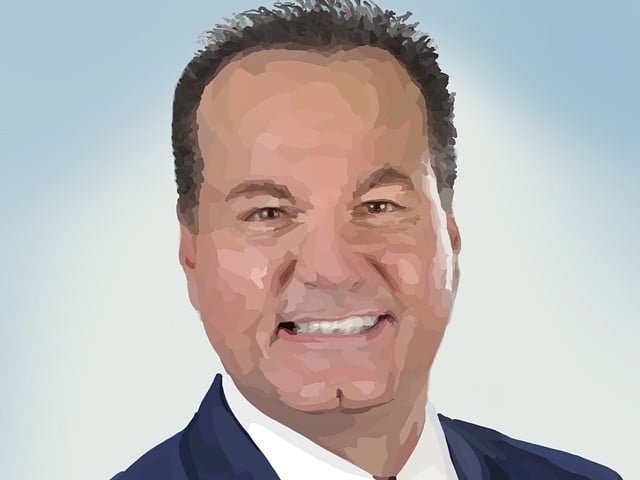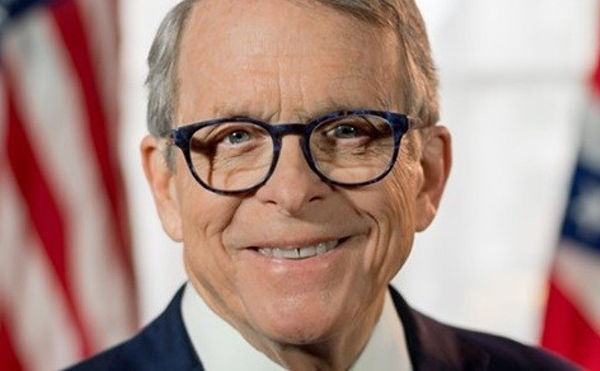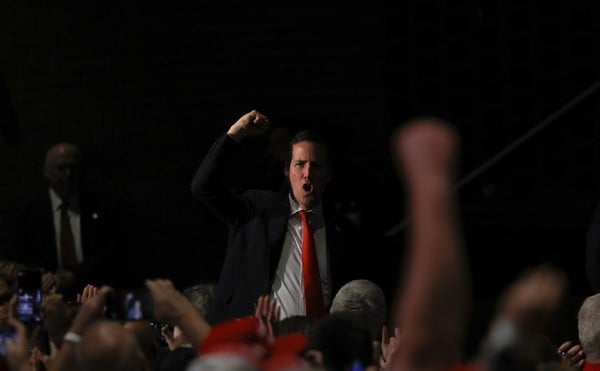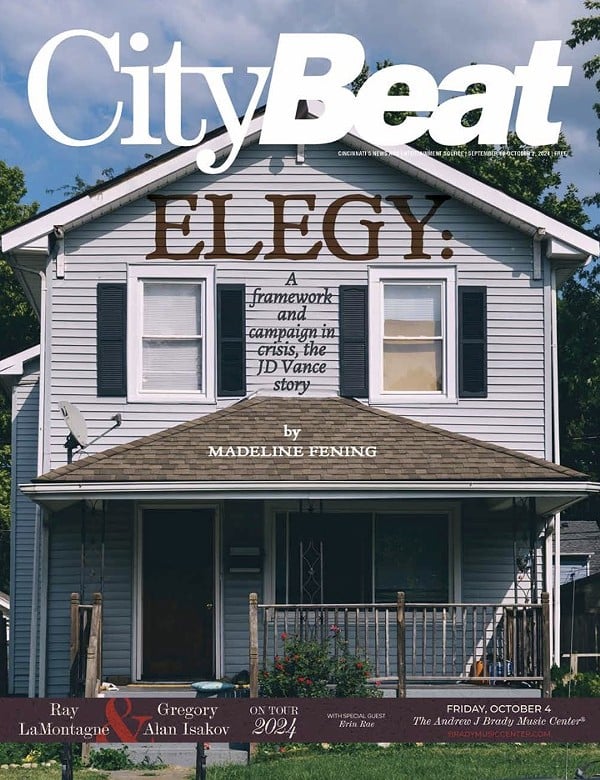Amanda Bailey didn’t know, when she moved into her new house on McKinley Street in Middletown, Ohio, that she would be living inside a spectacle.
“I was literally unpacking my car,” Bailey tells CityBeat on a sticky afternoon in August. “My neighbor came out. He introduced himself, told me he's lived in the neighborhood for 53 years, told me a little bit about the street, and then he started telling me about the history of the house.”
She didn’t know it at the time, but his welcome-to-the-neighborhood introduction was also a warning.
“At first, it freaked me out,” she tells CityBeat from her front porch. “It first started with passersby and people just staring at the house. Me and my kids would be sitting on the front porch, as we would do every day, and people would just stare, have their phones up, and then all of a sudden the reporters started coming.”
Bailey, a mother of six, lives in the childhood home of Republican Senator-turned-vice presidential candidate JD Vance. At least, this was his home when he was living with his “Mamaw,” a character perhaps more infamous than Vance himself in Hillbilly Elegy: A Memoir of a Family and Culture in Crisis — Vance’s account of growing up in Middletown.
Bailey didn’t read the book, but she watched the 2020 film adaptation starring Glenn Close and Amy Adams.
“I look at the movie, and I'll go back and I'll try to see, like, okay, where was that at? Where did this happen at?” Bailey says after politely (and understandably) declining our request to see the home’s interior. “But I mean, the stories…I would love to know if there's actually guns in my walls, but unfortunately, I rent.”
A house two doors down from Bailey has a Trump-Vance 2024 yard sign, and another has a small sticker on their mailbox, but the street doesn’t appear to be a parade of support for either Trump or his challengers, Vice President Kamala Harris and her VP pick, Minnesota Gov. Tim Walz.
click to enlarge 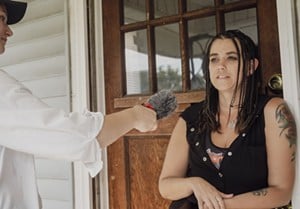
Photo: Aidan Mahoney
CityBeat interviews Amanda Bailey, who currently lives inside JD Vance's old home in Middletown
CityBeat asked Bailey if she supports the Trump-Vance ticket.
“I would say I support Trump,” Bailey says.
But not so much Vance?
“Yes and no. I’m on the fence about that,” she replies. “I mean, he has potential, but they all have potential. They all say what they want to say just to get in that office, in my book.”
Vance’s struggles can be traced back to the porch where Bailey casts doubt upon him now, but much has changed about his moral framework since his early days in Middletown. Ebbing and flowing between hatred and admiration for his running mate, for elites, for the poor – taking on religious leanings from tech billionaires and swapping a legal career for capital investments. Freshly 40 years old, Vance’s winding journey from self-proclaimed “hillbilly” to vice presidential nominee suggests a man still in search of a purpose and a campaign for which his Ohio Senate colleague believes there’s only one ending.
click to enlarge 
Photo: Lydia Schembre
JD Vance held his first solo campaign rally as the Republican Vice Presidential nominee at Middletown High School on July 22.
“I'm not going to talk a lot about a fellow senator who I expect to be working with a year from now,” Sen. Sherrod Brown tells CityBeat.
Before President Joe Biden dropped out of the race on July 21, the Trump-Vance ticket led the polls by 3.2 points. This is according to polling analysis website 538, which is part of ABC News and collects data from national polls and those conducted in battleground states. Harris has narrowly surpassed Trump in polling since becoming the Democratic nominee. As of Sept. 11, the day after the first Trump-Harris debate, Harris is ahead by 2.7 points.
As of press time, CityBeat’s repeated requests for an interview with Vance were never met with a direct response from his team.
Vance’s evolving relationship with Middletown
Of all of Middletown’s city council members, only one responded to CityBeat’s request for comment for this story. This author, who was born and raised in Middletown, used to drink her parents’ beer in the basement with this council member. He doesn’t deny it.
“I'm fine with that, yeah,” Zack Ferrell confirms with CityBeat. “It's part of our childhood.”
Although this author and Ferrell shared pilfered Milwaukee's Best Lights and some overlapping classes, Ferrell’s home life looked quite different.
“I grew up in a household of addiction,” Ferrell says. “If my grandparents weren’t around, I wouldn't have been anything. I wouldn't have gone anywhere.”
Ferrell’s story evokes details in Vance’s memoir, Hillbilly Elegy, which chronicles the path of Vance’s family from Eastern Kentucky to Middletown, Ohio. Many “hillbillies” took this path, Vance says, in pursuit of the middle class life offered by stable manufacturing jobs. But for Vance’s family and many others on the “hillbilly highway,” he writes, abuse of substances and of one another doomed their attempts at assimilation and upward mobility.
Vance describes his family’s errors starkly, recounting his mother’s opioid addiction and scores of failed relationships with cutting disdain. Though Vance found heroes in his older sister and his famous gun-toting Mamaw, his fatalistic view of Middletown’s working class identifies just one villain: themselves.
“We talk about the value of hard work but tell ourselves that the reason we’re not working is some perceived unfairness: Obama shut down the coal mines, or all the jobs went to the Chinese. These are the lies we tell ourselves to solve the cognitive dissonance—the broken connection between the world we see and the values we preach,” Vance writes in chapter nine of Hillbilly Elegy.
“But, the one thing I will say is he did not do Middletown any favors with that book,” says Zack Ferrell.
The book, released in June 2016, was an instant success, widely praised as required reading for those scrambling to understand why Donald Trump won the White House. Conservative writer Rod Dreher praised Hillbilly Elegy in The American Conservative, saying “Vance has earned the right to make those judgments,” and later pointed out that liberals “praise [Vance’s] points about the poor needing to understand that whatever structural problems they face, they retain moral agency.” But historian Bob Hutton wrote that Vance's Hillbilly Elegy arguments about bootstrapping were steeped in eugenics and “a work of self-congratulation,” according to his essay in Jacobin. Vance became an overnight figurehead for news networks seeking a Rust Belt perspective, dragging Middletown’s 50,000-odd population into a spotlight it never asked for and never saw coming.
“I identify with so much of it. I think it's his story of growing up in Middletown,” Ferrell says. “But, the one thing I will say is he did not do Middletown any favors with that book.”
Editor's note: Between CityBeat's interview with Ferrell and the publication of this story, Ferrell resigned from his council position. He told fellow councilmembers he needed a better work-life balance, according to Journal News.
After news broke that Vance would be former President Donald Trump’s running mate, Middletown City Schools posted a celebratory “Middie Rising” photo of the alum on the district’s social channels. Edit history on the post shows its author eventually removed an exclamation point from the post, and comments were quickly removed and turned off after jabs were made at Vance. Middletown, despite sitting within the reliably red Butler County, had a unique bone to pick with Vance after the release of his controversial memoir. Not everyone in the district was ready to celebrate the veep news.
“Up until Vance garnered the spotlight with his book, I would agree that he represented Middie-Rising. But how is telling the world that your hometown sucks, positive?” Tammy Daniels, a retired English teacher for the district,
told CityBeat after the announcement. “How a person reaches the level of success that Vance has is more important than being successful. He has said horrible things about immigrants, women and has said if he had been where Mike Pence was on Jan. 6, we wouldn’t have certified the election, defying our Constitution. I would like to be proud of a hometown person being picked as a vice presidential running mate, even if I disagreed with his politics, but I can’t be. It’s not his politics I disagree with but the lack of integrity in his character.”
click to enlarge 
Photo: Lydia Schembre
JD Vance held his first solo campaign rally as the Republican Vice Presidential nominee at Middletown High School on July 22.
One week after being announced as Trump’s running mate,
Vance took the stage of Middletown High School’s auditorium to rally supporters. It had been eight years since Vance marred Middletown with
Hillbilly Elegy, but after walking across the stage of his alma mater, he professed a love for the town nowhere to be found in the pages of his book.
“This town was so good to me,” Vance said to the screaming MAGA-clad crowd.
Why Vance?
Although Vance had hundreds from Trump’s base in the palm of his hand during the Middletown rally, it was less than a decade ago that Vance openly disavowed and mocked the man who would later become his running mate.
“I’m a Never Trump guy,” Vance said in a 2016 interview with Charlie Rose about Hillbilly Elegy. “I never liked him.”
In a 2016 Atlantic essay, Vance compared Trump's MAGA movement to a "quick high.”
"There is no self-reflection in the midst of a false euphoria," Vance wrote. "Trump is cultural heroin. He makes some feel better for a bit. But he cannot fix what ails them, and one day they'll realize it."
Vance also called Trump “America’s Hitler” in messages to a former college roommate in 2016. The digs continued on Twitter: “My god what an idiot,” he said in now-deleted tweets, referencing Trump.
He’s since said he regrets the comments about Trump and claimed his views have evolved over the course of Trump’s first term.
“I’ve been very open that I did say those critical things and I regret them, and I regret being wrong about the guy,” Vance said in a 2021 Fox interview. “I think he was a good president, I think he made a lot of good decisions for people, and I think he took a lot of flak.”
Trump famously cuts ties with those who aren’t all-in on his vision, but he publicly forgave Vance for his past comments while endorsing his senate candidacy in 2022, Vance’s first political race.
“Like some others, JD Vance may have said some not-so-great things about me in the past, but he gets it now, and I have seen that in spades," Trump wrote in a statement issuing the endorsement. "He is our best chance for victory in what could be a very tough race."
With only two weeks of campaigning as a Trump-endorsed Republican, Vance’s poll numbers surged, outpacing former Republican State Treasurer Josh Mandel for the number one spot in the Republican primary. He went on to defeat Democratic challenger Tim Ryan by seven points.
David Niven is a political science professor at the University of Cincinnati, where he teaches courses on American political thought and elections. He tells CityBeat that Trump’s 2022 endorsement proved useful to Vance, but now he’s cashing in on that loyalty.
“The fact that [Vance] was selected as the running mate is really, really telling,” Niven says. “They didn't choose anyone they thought was going to bring them more votes. They chose somebody who would be a loyal companion, who would be a sidekick, who would be the lap dog. [...] He’s really very much a 25th Amendment pick here, somebody who will never question a potential president that he would serve under.”
Traditionally, Niven says, veep picks are supposed to balance out the qualities of the person at the top of the ticket. Former Indiana Gov. Mike Pence did just that in 2016, appealing to evangelicals and offering years of political experience between the U.S. House and governorship.
“That was a very traditional pick,” Niven says. “This is the opposite of traditional. [Vance] doesn't bring anything to the ticket that Trump didn't already have. He doesn't have an in with a particular constituency that Trump didn't already have. He doesn't have any great regional appeal. And even if you want to believe that Vance offers some strength in his home state of Ohio, Trump was already very likely to win Ohio.”
Even the functionality of a running mate during a presidential campaign doesn’t give Vance much to bring to the table when Trump prefers a one-man show, according to Niven.
“One of the weird dynamics in this race is [that] often vice presidential candidates are used to level attacks. They're going to be the more aggressive candidate,” Niven says. “But Trump attacks all day long. He doesn't need an attack dog by his side. It's an unusual situation where, as a campaign asset, there's not a heck of a lot that Vance can offer that they weren't already doing.”
“I think a great issue with JD Vance is, well, who really is he? Is he the JD Vance who said Trump is America's Hitler, or is he the JD Vance who stood beside Trump?” Niven adds. “When Trump said, ‘JD kisses my ass,’ and he just went along kissing, which of those folks is he?”
The idea that Vance has one foot in the door predates his sharp pivot on Trump. He attacks the elite class, most often liberals, in certain parts of his memoir, describing them as judgemental and out of touch with his community while still yearning to adopt their qualities.
“The lesson? Powerful people sometimes do things to help people like me without really understanding people like me,” Vance writes in chapter 11.
“Sometimes I view members of the elite with an almost primal scorn—recently, an acquaintance used the word “confabulate” in a sentence, and I just wanted to scream. But I have to give it to them: Their children are happier and healthier, their divorce rates lower, their church attendance higher, their lives longer. These people are beating us at our own damned game,” Vance writes in his memoir’s conclusion.
click to enlarge 
Photo: Aidan Mahoney
South Main Street in Middletown, Ohio.
But the other foot is planted firmly on necks of fellow working class Middletown “hillbillies” who “must wake the hell up” from their own victimhood and break the cycles of poverty:
“People talk about hard work all the time in places like Middletown. You can walk through a town where 30 percent of the young men work fewer than twenty hours a week and find not a single person aware of his own laziness […] the rhetoric of hard work conflicts with the reality on the ground,” Vance writes in chapter four of Hillbilly Elegy.
But Vance, who attended Yale Law School, has since ascended to a massive level of wealth and cultivated connections that secured him an elite title, something Niven says is antithetical to his MAGA campaign messaging.
“One of the really odd things about Vance is, he is a fabulously wealthy Silicon Valley, Ivy League-educated populist, which is to say he is all of the ‘thems,’” Niven says. “He is all of the ‘thems’ wrapped into one. [He is] now running against ‘them,’ running against exactly who he is.”
During Vance’s July campaign rally in Middletown, he addressed those vague “thems.”
“We really have been forgotten in Middletown, Ohio,” Vance said. “They think that we’re backwards, they think that we’re bad people, they think that we don’t know how to do anything and we do. This is where things are made, this is the source for America’s greatness.”
Capital and christianity
In his own pursuit of American greatness, Vance started his venture capital career in 2016 as a junior investor at Mithril Capital, a firm backed by controversial tech billionaire and GOP mega-donor Peter Thiel. While the early Facebook investor and co-founder of PayPal describes himself as a libertarian, Thiel’s views have been criticized by Democrats as dangerously far-right.
"I no longer believe that freedom and democracy are compatible," Thiel wrote in a 2009 essay for Cato Unbound, a Cato Institute web publication. Adding that “the extension of [voting rights] to women [...] rendered the notion of ‘capitalist democracy’ into an oxymoron.”
Then there’s the 2016 "Right Wing Dinner Squad" he reportedly hosted, which included white nationalist Kevin DeAnna as a guest. DeAnna spent six years running the Youth for Western Civilization student group, which served as a far-right youth organization for “the web-savvy white nationalist movement,” according to the Southern Poverty Law Center.
Vance and Thiel’s friendship blossomed in Silicon Valley, just as Hillbilly Elegy was released. Thiel connected Vance with a network of elite tech leaders, including David Sacks, who donated $1 million to a pro-Vance super PAC in 2022. This is pocket change compared to Theil, who poured a record $15 million into Vance’s senate campaign.
But Theil gave Vance more than a new wellspring of money and connections. His billionaire friend helped usher in a higher-power mindset that translated to business and faith.
click to enlarge 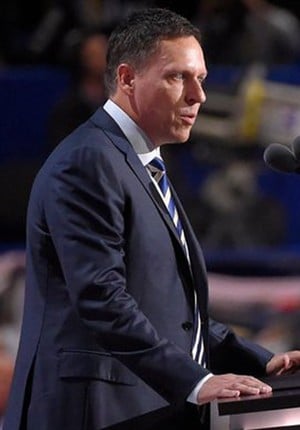
Peter Thiel speaks on the fourth day of the 2016 Republican National Convention.
“My worry that I had prioritized striving over character took on a heightened significance: striving for what? I didn’t even know why I cared about the things I cared about. [...] I looked to the future, and realized that I’d been running a desperate race where the first prize was a job I hated,” Vance writes in a 2020 essay published in The Lamp, a Catholic magazine. “I began immediately planning for a career outside the law, which is why I spent less than two years after graduation as a practicing attorney. But Peter left me with one more thing: he was possibly the smartest person I’d ever met, but he was also a Christian.”
With new contacts in his phone and new faith in his heart, Vance co-founded his own venture capital firm in 2020, Narya Capital, which was funded by Thiel and Eric Schmidt, a former Google executive, among others.
Narya’s website says the firm is “focused on using technology and science to solve for the future,” by investing in companies that range from health science to space security, but also in eyebrow and headline-raising companies like Rumble, the “free speech” video service alternative to YouTube, and Hallow, a Catholic prayer app that came under fire for its privacy settings that would allow the company to sell users’ prayer data.
Rotting on the vine
Of all of Vance’s venture capital endeavors, he’s only served on the board for one company: AppHarvest.
“It’s not just a good investment opportunity, it’s a great business that’s making a big difference in the world,” Vance told Fox Business when the company went public at the start of 2021.
AppHarvest promised high-tech solutions to traditional farming through a hydroponic indoor farm startup in the Eastern Kentucky city of Morehead. Part of the promise included second-chance employment for blue collar workers who were in recovery, but it didn’t last long.
“The idea is there, the sentiment is there. The execution, horrible,” said one former AppHarvest employee, who we will call Sarah.
Sarah has requested anonymity for this story for the sake of protecting her identity and future employment in the area.
She loved the prospect of AppHarvest’s mission to serve not only the nutritional needs of Kentuckians but the economic needs of Eastern Kentucky residents.
“I go camping a lot near the area, and I'll still drive by it sometimes,” Sarah says. “Nothing ever, ever, ever prepared me for the view coming around the curve on the road and seeing it. I mean, it's amazing, it's incredible. I was so impressed. I applied the day after I went there.”
click to enlarge 
Photo: Via AppHarvest
AppHarvest filed for Chapter 11 bankruptcy in July 2023.
Before she even set foot in her corporate office – her new position was related to marketing – red flags popped up, though she only recognized their color in hindsight. While she was in the interview process, she was told that all of AppHarvest’s corporate employees were at the farm harvesting tomatoes.
“Because they were so understaffed for the amount of space,” Sarah recalls. “It wasn't a red flag either. To be honest, that kind of excited me. I like to be able to be hands-on, and kind of knowing everything that's going on, and help where I can. It was sort of intriguing to me that when they need help, they would lean on the people that work there. However, I came to realize that that was not as savory as I had hoped that it was.”
Within a matter of weeks after Sarah was hired, word of problems in the company’s greenhouse started to spread around the office. An investigation by the Kentucky Center for Investigative Reporting and
Grist found that greenhouse employees were working in grueling conditions: dehydration, heat exhaustion and medical emergencies from heat indexes sometimes reaching 155 degrees.
“Being in a 150-degree greenhouse with a bottle of water is not sufficient, no matter what anyone says,” Sarah tells CityBeat. “At the end of the day, it was more about quota. I know that everyone was being tasked with overtime constantly. We were missing the marks so much that basically every single person there was getting overtime constantly. And not only were they getting it and wanting it, they were being required to do it.”
Worker burnout and reported loss of health insurance allegedly prompted AppHarvest to abandon its initial hiring ethos and seek workers from outside the Morehead area, according to former employees.
“I started to notice when buses of Hispanic workers started showing up every day to the farm,” Sarah recalls. “I do know for a fact that they were all bused back out to their hotels and motels where they were being put up prior to Mitch McConnell coming to speak at the farm.”
Vance and Sarah’s participation in the company only overlapped by three weeks – he left in April 2021 to start his senate campaign – but she wonders if Vance and other board members were aware of the writing she saw so clearly on the wall.
"Especially as an investor, you would think you would want to walk around and make sure things are running smoothly," Sarah, a former AppHarvest employee, tells CityBeat.
“I think that it was in a downward spiral from the beginning,” Sarah says. “I was astounded with the things that we spent money on that were unnecessary. Every single thing in the office is branded, like the glassware, the notepads, the recycled pens, the mouse pads. We had a $5,000 coffee maker that made any kind of coffee that you want.”
CityBeat told Sarah that it appeared, from her account, that the environment for corporate employees far outpaced the quality of conditions for those working the farm.
“Oh, good lord, yes,” she says. “We had state of the art call pods, meeting rooms – when I said that we were required to go in-office, there was no complaints. We had a person on staff who would just be designing new office space.”
Luke Schroeder, a spokesperson for Vance, told CNN that the now-VP nominee “was not aware of the operational decisions regarding hiring, employee benefits, or other workplace policies which were made after he departed AppHarvest’s board.”
This makes sense to Sarah – but still disappoints her.
“I would think if I was a high level on a board of such a big project with such promise that I would want to be involved, that would be the idea behind being on the board, right? And especially as an investor, you would think you would want to walk around and make sure things are running smoothly.”
Cringe at best, scary at worst
Fast forward to the summer of 2024, and things still aren’t running smoothly for Vance.
During his July 22 campaign stop at Middletown High School, Vance made headlines for attempting a sugar-free joke about racism.
“It is the weirdest thing to me, Democrats say it is racist to believe – they say it’s racist to do anything. I had a Diet Mt. Dew yesterday and one today. I’m sure they’re going to call that racist, too,” Vance said to quiet chuckles from the packed auditorium of supporters.
“It’s good,” Vance said, continuing with the bit, reeling in slightly more chuckles. He then appeared to react as if the crowd is uproarious, though it’s not, laughing and dropping his head before pointing to the quiet crowd: “I love you guys.”
The awkward moment would have cycled out of the public’s attention sooner if Vance hadn’t continued apace with gaffes that appear to be ungenerously scripted for the junior senator.
During an Aug. 22 photo-op at a donut shop in Valdosta, Georgia, Vance attempted to engage in small talk with the employees, something critics didn’t know you could blunder so badly.
“I'm JD Vance, I'm running for vice president,” Vance said to an employee who told him she didn’t want to appear on camera.
She replied: “Okay.”
The staff’s indifference to Vance radiated through a donut shop free of patrons and full of secret service.
Niven, who studies and researches political campaigns, admits it’s hard to run a smooth campaign, to put yourself out there for the world to dissect.
“This stuff is not easy,” Niven says. “It's not easy to present yourself to a national audience. It's not easy to connect with every donut seller in America. But he's done a uniquely bad job of it so far, despite the enormity of not just his ego, but of the Trump campaign's ego.”
Although an unsuccessful soda joke and an even more unsuccessful donut shop run aren’t of much consequence to democracy, the campaign has dealt with odd and extreme statements made by Vance since he entered the political arena.
Perhaps the most notable resurfaced video first appeared in 2021. In a conversation with then-Fox News host Tucker Carlson, Vance says the U.S. is being run by "a bunch of childless cat ladies who are miserable at their own lives and the choices that they've made and so they want to make the rest of the country miserable, too."
In the clip, Vance continues: "It's just a basic fact – you look at Kamala Harris, Pete Buttigieg, AOC – the entire future of the Democrats is controlled by people without children. And how does it make any sense that we've turned our country over to people who don't really have a direct stake in it?"
Vance defended the resurfaced comment to former Fox News host Megyn Kelly in July, calling it a “sarcastic comment,” but he has made similar comments in more serious settings before.
“You know, so many of the leaders of the left, and I hate to be so personal about this, but they’re people without kids, trying to brainwash the minds of our children. And that really disorients me and it really disturbs me,” Vance said. “Randi Weingarten, who’s the head of the most powerful teachers union in the country, doesn’t have a single child. If she wants to brainwash and destroy the minds of children, she should have some of her own and leave ours the hell alone.”
Again in 2021, Vance took another specific jab at adults without children, this time during a speaking engagement at the Intercollegiate Studies Institute.
"He says odd things in odd ways that attack odd villains," David Niven says.
“When you go to the polls in this country as a parent, you should have more power – you should have more of an ability to speak your voice in our democratic republic – than people who don’t have kids,” he said. “Let’s face the consequences and the reality: If you don’t have as much of an investment in the future of this country, maybe you shouldn’t get nearly the same voice.”
Niven doesn’t see any benefit to Vance making these comments, past or present.
“You don't typically run for office by demonizing a large portion of the electorate who otherwise might vote for you,” Niven says. “There are women in the Republican Party who don't have children, for example. I think he’s just a fundamentally odd person. I think, ‘You don't say those things.’ And he didn't just say one odd thing or two odd things, three odd things. He says odd things in odd ways that attack odd villains.”
click to enlarge 
Photo: Vice President Kamala Harris on
X Vice President Kamala Harris speaks with Prime Minister Justin Trudeau on Feb. 1, 2021.
Remaining in lockstep with Trump, Vance has also repeatedly criticized Harris for appearing to behave outside her assumed racial or ethnic identity. This comes after Trump claimed Harris, the daughter of a Black father and Indian mother, “happened to turn Black” in recent years.
“She was always of Indian heritage, and she was only promoting Indian heritage. I didn’t know she was Black until a number of years ago, when she happened to turn Black, and now she wants to be known as Black. So I don’t know, is she Indian or is she Black?” Trump said at a National Association of Black Journalists convention in Chicago on July 31. “I think somebody should look into that, too.”
When CNN questioned Vance about these statements, he called Harris a “fundamentally fake person” and “a chameleon.”
"I believe that Kamala Harris is whatever she says she is. But I believe importantly that President Trump is right that she's a chameleon,” Vance said. “She pretends to be one thing in front of one audience. She pretends to be something different in front of another audience.”
Cincinnati Mayor Aftab Pureval, whose parents are both first-generation Americans – his mother is from Tibet, and his father is from India – tells CityBeat he’s angered but not surprised by Trump and Vance’s statements about Harris.
click to enlarge 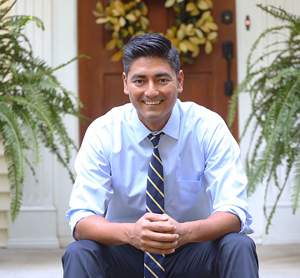
Photo: Provided
Cincinnati Mayor Aftab Pureval
“This is on the heels of President Trump trying to put the Central Park Five under the death penalty. It's on the heels of him questioning the citizenship of our first black president and his place of birth. It's on the heels of policy after policy that is xenophobic and racist while he was in office,” Pureval says. “Whenever an Asian American or a Black woman raises their hand and tries for a higher office, they are inevitably met with racism and offensive attacks.”
Vance has said he needed to defend his own biracial children from racist attacks during his 2022 senate campaign. His wife, Usha Vance, was born to Indian immigrants.
When again asked by a CNN reporter about whether he, the father of three biracial children, was taken aback by Trump’s comments about Harris’ racial identity, Vance doubled down.
“They don’t give me pause at all,” Vance told reporters during an interview near the U.S.-Mexico border in Arizona.
click to enlarge 
Photo: Lydia Schembre
JD Vance and his wife, Usha Vance, during his first solo campaign rally as the Republican vice presidential nominee at Middletown High School on July 22.
“I applaud Senator Vance for how proud he is of his family and of his in-laws and of his children,” Pureval tells CityBeat. “But those are experiences that his own family have gone through and will go through, and that's just a reality of existing in this country at this time as someone with mixed ethnicity.”
Though they occupy opposite sides of the political spectrum, Pureval tells CityBeat his family has much in common with Vance’s.
“My wife is from Appalachia. My own children will go through this period – and I've already started, they're too young right now – but I've already started thinking about, how am I going to talk to them about how to celebrate their Appalachian background? Their Tibetan background, their Indian background? And also, the fact that they're an American citizen, first and foremost,” Pureval tells CityBeat. “It's a modern process.”
Assimilation pressures, holding onto pieces of your identity, culture shock, judgment – Vance’s book documents how strongly he felt these societal forces as a “hillbilly” navigating elite spaces and how his own parents and grandparents did the same once they left Eastern Kentucky for the suburbs of Ohio:
“I lived among newly christened members of what folks back home pejoratively call the ‘elites,’ and by every outward appearance, I was one of them: I am a tall, white, straight male. I have never felt out of place in my entire life. But I did at Yale,” Vance writes in chapter 12.
“You can just imagine a well-bred housewife watching out the window in horror as her Kentucky-born neighbor slaughtered squawking chickens just a few feet away,” Vance writes in chapter two.
Pureval understands this kind of reflection, and he says he can empathize with Vance in that way.
“You know, I guess I have a certain amount of empathy for someone who is trying to articulate how his background, maybe his family's background, more accurately, impacts his day to day life. That is something that I certainly reflect on a lot,” Pureval says. “But what frustrates me more than a book that he wrote several years ago are the xenophobic and oftentimes racist policies that he is advocating.”
Targeting Haitians in Springfield
On Sept. 9, Vance took to X, formerly Twitter, to promote a false conspiracy theory that Haitian immigrants were stealing and eating other people’s pets in Springfield, Ohio, about an hour north of Cincinnati.
“Months ago, I raised the issue of Haitian illegal immigrants draining social services and generally causing chaos all over Springfield, Ohio,” Vance posted. “Reports now show that people have had their pets abducted and eaten by people who shouldn’t be in this country. Where is our border czar?”
This comes as an estimated 12,000 to 15,000 immigrants have settled in the region surrounding Springfield, according to the city. The rise in population has put a strain on resources such as housing, health care and education, but city officials have confirmed the migrants are in the country legally, many as recipients of Temporary Protected Status.
A spokesperson for the city of Springfield confirmed to ABC News that the claims of immigrants eating pets are false, saying there have been "no credible reports or specific claims of pets being harmed, injured or abused by individuals in the immigrant community."
The Springfield News-Sun reported that the unsubstantiated claim first gained traction on social media. Some users claimed a picture of a man carrying a goose was a Haitian in Springfield, but the photo turned out to be taken in Columbus, Ohio. Others shared a video of a woman being questioned by police for allegedly eating her cat, but this took place in
Canton, Ohio.
NPR reported that similar unsubstantiated claims about Haitians in Springfield first originated on Gab, a far-right social platform, in the form of a comment from a user claiming, "once Haitians swarm into a town animals start to disappear."
One day after posting the false claim about Haitians eating pets in Springfield, Vance claimed that his office heard the rumor from Springfield residents directly and admitted the claims might not be true.
“In the last several weeks, my office has received many inquiries from actual residents of Springfield who've said their neighbors' pets or local wildlife were abducted by Haitian migrants,” Vance wrote on X. “It's possible, of course, that all of these rumors will turn out to be false.”
He goes on to paint a picture of a Springfield in dire distress as a result of Haitian migrants settling in the area, telling reporters and activists to “spare your outrage.”
Rewind to Vance’s 2016 memoir, in which he directly calls out “conspiracy-mongers” who convince white working class voters to believe “the worst of their society.”
When he raises this topic in Hillbilly Elegy, Vance is primarily referring to the conspiracy theory that President Barack Obama was not a U.S. citizen – a lie that was heavily perpetuated by his now-running mate. He also references 9/11 conspiracies from right-wing radio personality Alex Jones, email chains about Obamacare microchips and a story from WorldNetDaily suggesting the Sandy Hook mass shooting was a false flag.
“Admittedly, there is an industry of conspiracy-mongers and fringe lunatics writing about all manner of idiocy…” Vance writes in chapter 11. “With little trust in the press, there’s no check on the internet conspiracy theories that rule the digital world. [...] This isn’t some libertarian mistrust of government policy, which is healthy in any democracy. This is a deep skepticism of the very institutions of our society. And it’s becoming more and more mainstream.”
Trump repeated the lie about Haitians in Springfield during the Sept. 10 presidential debate, saying: “In Springfield, they're eating the dogs. The people that came in. They're eating the cats. They're eating – they're eating the pets of the people that live there. And this is what's happening in our country.”
Days later, a bomb threat was made to “multiple agencies and media outlets” in Springfield, according to the city commission office.
“If I have to create stories so that the American media actually pays attention to the suffering of the American people, then that’s what I’m going to do,” JD Vance said on CNN.
During a Sept. 15 interview on
CNN, Vance appeared to acknowledge that he was spreading a known falsehood about Haitians in Springfield.
“The American media totally ignored this stuff until Donald Trump and I started talking about cat memes,” Vance told CNN's Dana Bash. "If I have to create stories so that the American media actually pays attention to the suffering of the American people, then that's what I'm going to do."
The situation in Springfield comes as the Trump-Vance campaign continues to take heat for the candidates’ connections to Project 2025, a right-wing initiative created by the Heritage Foundation. The project lays out a plan for the first 180 days of a second Trump term. In addition to banning abortion and disbanding the Department of Education, this plan calls for state and local police to help carry out a mass deportation plan.
Ohio Capital Journal editor-in-chief and opinion columnist David DeWitt
penned a response to Vance’s false claims about Haitians in Springfield, saying his family has called Springfield home for three generations, and that his partner’s parents are Haitian immigrants.
“Sometimes the disgusting sewer of presidential year politics hits a little too close to home,” Dewitt says in the opening of his defense of his hometown and its people. “You end up watching a national conversation play out largely divorced from reality or the actual experiences of communities intimately connected to your own life.”
Election Day is Tuesday, Nov. 5.
This story is featured in CityBeat's Sept. 18 print edition.
Additional research for this report was provided by CityBeat contributor Ashley Paul.
Follow CityBeat's staff news writer Madeline Fening on X and Instagram.
















